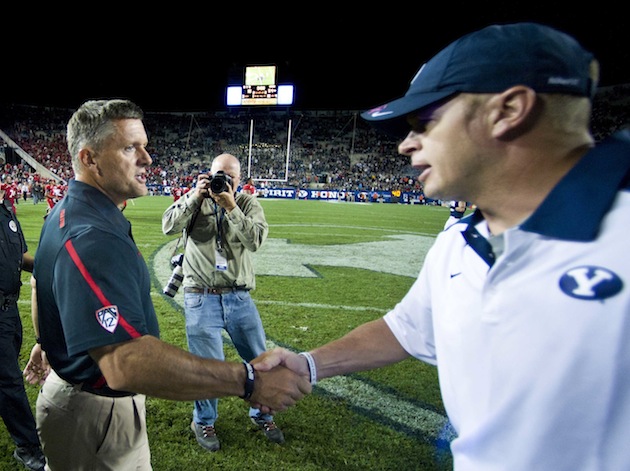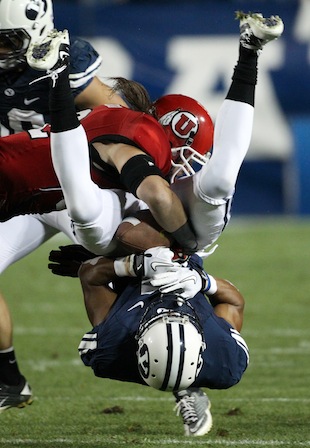
One of college football's greatest rivalries is on the brink of extinction and few are even noticing.
BYU and Utah have played each other since 1896 — or 1922 if you're a BYU fan — in a game that's affectionately called the "Holy War." It's the only rivalry in college football whose religious undertones create a salty dynamic on and off the field. Because of this, the rivalry has produced many ugly moments including a full-scale brawl, players climbing into the stands to beat up fans, fans attacking cheerleaders, coaches exchanging barbs and one BYU player calling anyone associated with the University of Utah a "low class loser."
In 2008, Utah defeated BYU in its final regular season game to go 12-0 and earn a spot in the Sugar Bowl. The Utes 31-17 victory over Alabama in New Orleans put them in the conversation for the national title and though they were denied a share of college football's ultimate prize, it's fair to say that season and the subsequent protests for equality, are part of why the BCS could undergo radical changes.
That season is also part of the reason Utah earned an invite to the Pac-12, which is what is putting the Holy War in jeopardy.
After the 2010 season, Utah went to the Pac-12 and BYU became an Independent leaving the rivalry game in flux. But the two teams reached a two-year agreement and there was hope the rivalry would continue to thrive despite the different conference affiliations. But as Utah looks toward future schedules and a nine-game Pac-12 schedule that's not getting any easier, the thought of playing BYU so early in the year doesn't seem so appealing after the contract expires after 2012.
"We've got to do what's best for us and what we're looking for, on our schedule is, the bottom line is balance," Utah coach Kyle Whittingham told KSL TV on Sunday. "That's the operative word that we're trying to achieve and (athletic director) Dr. (Chris) Hill is a very smart guy and he's gonna make sure that happens. But, like everybody else, I would hate to see it go away, but the bottom line is what's best for us and what's best for (BYU)."
 It's easy to understand Utah's dilemma especially as it continues to get used to playing the Pac-12 schedule every year. With only three nonconference games, the Utes need to get their footing early and see some early success before they head into a schedule that includes USC, the Arizona schools and occasionally Stanford or Oregon.
It's easy to understand Utah's dilemma especially as it continues to get used to playing the Pac-12 schedule every year. With only three nonconference games, the Utes need to get their footing early and see some early success before they head into a schedule that includes USC, the Arizona schools and occasionally Stanford or Oregon.
This is not an issue of whether Utah can beat BYU or vice versa, it's about the mental energy expended leading up to that game. For an entire week, heck, even the few weeks leading up to the contest, that's all anyone will talk about across the state. It's a big deal, can consume both teams and manifest into the biggest game of the season even if it's only the third week of the year. So Utah gets all jacked up for the Holy War on Sept. 15 and could hit an emotional wall for its Pac-12 season opener against Arizona State the following week.
Some Utah fans might say that's what happened last year. The Utes come off a tough loss to USC but rebounded to beat BYU 54-10. The Utes get two weeks to bask in the glory of a rivalry win and drop their first two Pac-12 games against Washington and Arizona State.
Of course it's easy to imagine the BYU response to this, but it's important to note this isn't about one team fearing the other, it's about smart scheduling. The way Utah wants to get away from the emotional drain of a rivalry game, BYU embraces it. Playing Utah is a huge feather in the Cougars' cap as they try to get into a BCS game without a conference automatic bid. BYU is still trying to stock its schedules, and is still working on getting agreements with consistently top-conference teams. In 2012, the Cougars scheduled teams such as Utah, Boise State, Notre Dame and Georgia Tech, but it also has Idaho, San Jose State and New Mexico State to round out the year as part of an agreement with the WAC. The schedule gets better with Texas in 2013 along with Notre Dame and new Big East members Boise State and Houston, but it's still might not be enough to be considered as a BCS busting-type campaign.
 Regardless of the scheduling pros and cons of this rivalry, it's an important game for the state. While yes, it has caused a lot of off-field issues that have driven many to ask for the game to cease, it's part of the fabric that makes Utah and BYU great football programs. And without it, whom will each other call their rival? No matter how much the Pac-12 tries to force it, Utah and Colorado aren't rivals. Similarly, BYU and Utah State is a fine game, but it doesn't have the same vitriol as the Holy War.
Regardless of the scheduling pros and cons of this rivalry, it's an important game for the state. While yes, it has caused a lot of off-field issues that have driven many to ask for the game to cease, it's part of the fabric that makes Utah and BYU great football programs. And without it, whom will each other call their rival? No matter how much the Pac-12 tries to force it, Utah and Colorado aren't rivals. Similarly, BYU and Utah State is a fine game, but it doesn't have the same vitriol as the Holy War.
Whittingham said if the Pac-12 went to an eight-game conference season then this wouldn't be as much of a problem, which could be an easy solution to keeping this rivalry afloat.
When it comes down to it, the two athletic directors will make the final call on whether this storied game will continue and BYU athletic director Tom Holmoe seems much more optimistic than Whittingham.
"I think as long as the talks are going, we'll work something out" Holmoe told the television station. "Utah's trying hard under the conditions of the Pac-12 and us as an independent. As long as the talks are going, I feel positive."
- - -
"Like" Dr. Saturday on Facebook for football conversations and stuff you won't see on the blog. And follow Dr. Saturday at its new home on Twitter: @YahooDrSaturday